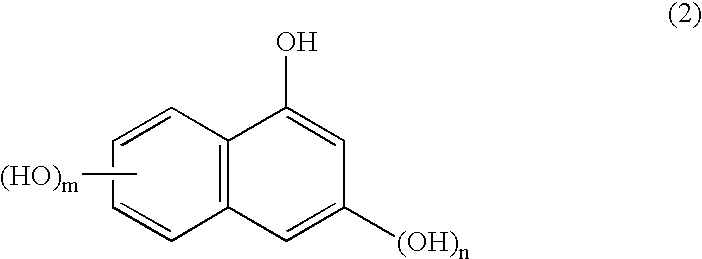Scale deposit inhibitor, process for its production, polymerizer whose inside wall is covered with the inhibitor, and process for production of vinylic polymers by the use of the polymerizer
a deposit inhibitor and scale technology, applied in the direction of liquid chemical processes, thin-film liquid gas reaction processes, gas-gas reaction processes, etc., can solve problems such as unfavorable effects, and achieve the effect of preventing the adhesion of scal
- Summary
- Abstract
- Description
- Claims
- Application Information
AI Technical Summary
Benefits of technology
Problems solved by technology
Method used
Image
Examples
example 1
[0063]25 g of 1-naphthol, 10 g of pyrogallol, 7 g of sodium hydroxide and 300 g of distilled water were fed to a 500 ml closed glass vessel equipped with a cooling capacitor. After the inside of the vessel was substituted by nitrogen, the resulting mixture was heated at 70° C. in a hot bath under agitation. Thereafter, 20 g of a 37 wt % aqueous solution of formaldehyde was added slowly under agitation. A condensation reaction was carried out under agitation for 5 hours by maintaining that temperature. A yellowish transparent aqueous solution was obtained.
[0064]An alkaline aqueous solution of the above condensation product was adjusted to a concentration of 0.5 wt % and applied to the inner wall (stainless steel) of a reactor for polymerizing vinyl chloride having an inner capacity of about 50 liters by a steam ejector spray.
[0065]Thereafter, the reactor was washed with water to obtain a polymerization reactor having a film formed on the inner wall. The thickness of the formed film e...
examples 2 to 16
[0068]Polymerization reactors having a film formed on the inner wall were obtained in the same manner as in Example 1 except that the types and amounts of the 1-naphthol, phenol and aldehyde were changed as shown in Table 1 and the condensation conditions were changed as shown in Table 2. The weights of the formed films are shown in Table 2. A scale adhesion prevention test was made on the obtained polymerization reactors, and coloration and colored foreign substance tests were made on molded products of the obtained vinyl chloride-based polymers. The results of the above tests are shown in Table 3.
[0069]Since a condensate obtained by using an acid catalyst is solid, it was dissolved in an alkali aqueous solution before use.
[0070]
TABLE 11-naphtholphenolaldehydedistilledmolarmolarmolarcatalystwatertypegratiotypegratio1)typegratio2)typeggEx. 1A1251B1100.46C1200.98Na7300Ex. 2A1251B2100.52C1130.61Na7300Ex. 3A1251B350.26C1181.02Na7300Ex. 4A1251B420.09C1161.04Na8300Ex. 5A2251B590.38C1140....
example 17
[0073]25 g of 1-naphthol, 10 g of catechol, 7 g of sodium hydroxide and 300 g of distilled water were fed to a 500 ml closed pressure vessel equipped with a cooling capacitor. The inside of the vessel was substituted by nitrogen gas and then heated at 70° C. in a hot bath under agitation. Thereafter, 13 g of a 37 wt % aqueous solution of formaldehyde was added slowly under agitation while that temperature was maintained.
[0074]The temperature of the reaction solution was then elevated to 100° C. at a rate of 0.7° C. / min under agitation and a condensation reaction was carried out at that temperature under agitation for 5 hours. As a result, a yellowish transparent aqueous solution of a scale adhesion preventing agent was obtained.
[0075]The alkaline aqueous solution containing the above condensation product was adjusted to a concentration of 0.5 wt % and applied to the inner wall (stainless steel) of a reactor for polymerizing vinyl chloride having an inner capacity of 50 liters by a s...
PUM
| Property | Measurement | Unit |
|---|---|---|
| temperature | aaaaa | aaaaa |
| temperature | aaaaa | aaaaa |
| temperature | aaaaa | aaaaa |
Abstract
Description
Claims
Application Information
 Login to View More
Login to View More - R&D
- Intellectual Property
- Life Sciences
- Materials
- Tech Scout
- Unparalleled Data Quality
- Higher Quality Content
- 60% Fewer Hallucinations
Browse by: Latest US Patents, China's latest patents, Technical Efficacy Thesaurus, Application Domain, Technology Topic, Popular Technical Reports.
© 2025 PatSnap. All rights reserved.Legal|Privacy policy|Modern Slavery Act Transparency Statement|Sitemap|About US| Contact US: help@patsnap.com



